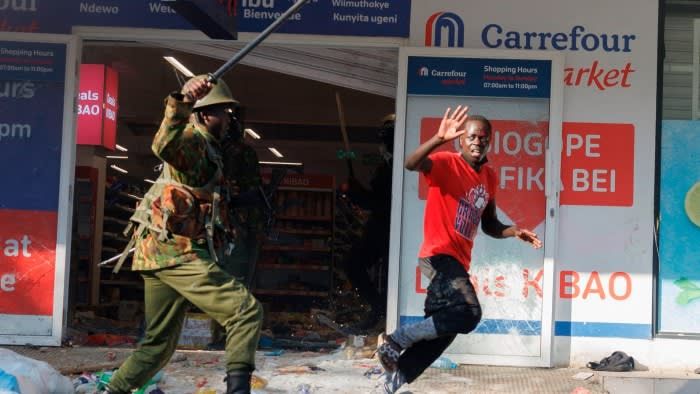Kenya’s president drops tax rises after deadly protests

Access the Editor's Digest at no cost
Roula Khalaf, the person in charge of the FT, picks out her top stories for this weekly email.

The president of Kenya announced that he will not approve a divisive bill that includes significant tax increases. This decision comes after protests led by young people turned violent when demonstrators breached the parliament building.
President William Ruto stated in a speech to the nation on Wednesday that there was a lot of unhappiness expressed by the people after the bill was approved by lawmakers on Tuesday, unfortunately leading to some deaths.
He stated that after carefully listening to the citizens of Kenya who have clearly expressed their opposition to the finance bill 2024, he will not approve it and it will be pulled back.
The president's decision comes after human rights organizations claim that the police were responsible for the deaths of at least 23 individuals and the injuries of 300 others during the protests that took place on Tuesday.
A group of activists, which includes the Police Reforms Working Group and other organizations like the Kenya Human Rights Commission, stated that law enforcement officers fired at young demonstrators who were not armed outside the parliament. The violent incidents of shootings and deaths continued into the night.
The organizations mentioned that law enforcement officials shot and fatally wounded multiple individuals in Githurai, a neighborhood located on the outskirts of Nairobi, long after the demonstration had finished.
Ruto called the invasion of parliament an act of treason and stated that his nation had faced an unprecedented assault on its democratic values. He emphasized that a lawful demonstration of essential rights and freedoms had been sabotaged by a coordinated group of criminals.
Ruto also expressed gratitude towards Kenya's security forces for their efforts in responding to the recent incident where parts of the parliament building in Nairobi were damaged by fire. The army was called in to assist the police on Tuesday evening. As the protests are expected to persist, international governments and the UN have advised security forces to show restraint.
The government plans to implement tax hikes to generate an extra $2.3 billion in revenue for the upcoming fiscal year. Kenya is facing challenges in reducing its deficit, which currently stands at 5.7% of GDP in the 2023-24 financial year. The goal is to bring the deficit down to 3.3% in the following year and improve the country's public finances.
The actions were partly done to follow an IMF plan that needs Nairobi to raise money and cut government spending. Kenya's treasury secretary, Njuguna Ndung'u, had cautioned that not agreeing to the tax hikes completely could lead to a $1.5 billion gap in the budget, and suggested cutting expenses.
Ruto instructed the government's administrative branch to reduce spending on travel and the acquisition of vehicles. He also mentioned that the judiciary, parliament, and local governments should do the same.
Jacques Nel, who leads the Africa macro team at consulting firm Oxford Economics, stated in a research report that Ruto faces the challenge of managing two conflicting factors: a populace that is willing to use violence to defend their livelihoods, and a macroeconomic path that is on course for a crisis without significant international assistance.
The president suggested connecting with young individuals as the demonstrations have mainly been led by unemployed young Kenyans in recent days.
The demonstrations and the forceful response from law enforcement are reminiscent of the situation in Nigeria during the #EndSARS movement in 2020. During that time, Nigerian youths clashed with a notorious police unit called the Special Anti-Robbery Squad, which was accused of carrying out killings and demanding bribes without discrimination. The #EndSARS movement was abruptly halted when the Nigerian military intervened, resulting in the deaths of at least 12 protesters in Lagos.
Activists in Kenya are getting ready for big protests on Thursday. They are not scared of the government's actions and don't believe what Ruto is saying. They are referring to him as Zakayo, which means Zacchaeus in Swahili. A lot of young activists want to organize a march with 1 million people in Nairobi, using the hashtag #ZakayoStopKillingUs on social media.
Boniface Mwangi, an activist, shared on Instagram that while the arrogance may have disappeared, the lies haven't. He mentioned that goons and police were released to harm peaceful protesters the day before, but this will not prevent them from marching. He defiantly stated that they will continue to fight for their cause and urged others to join the 1 million people march the next day, expressing that no one can kill them all.
Davis Tafari, a 25-year-old activist leading the protests, stated that Ruto's attempt to appear more cooperative was just a tactic to deceive the people of Kenya. He added that they will continue to protest on the streets until justice is served for their friends who were killed.





















































